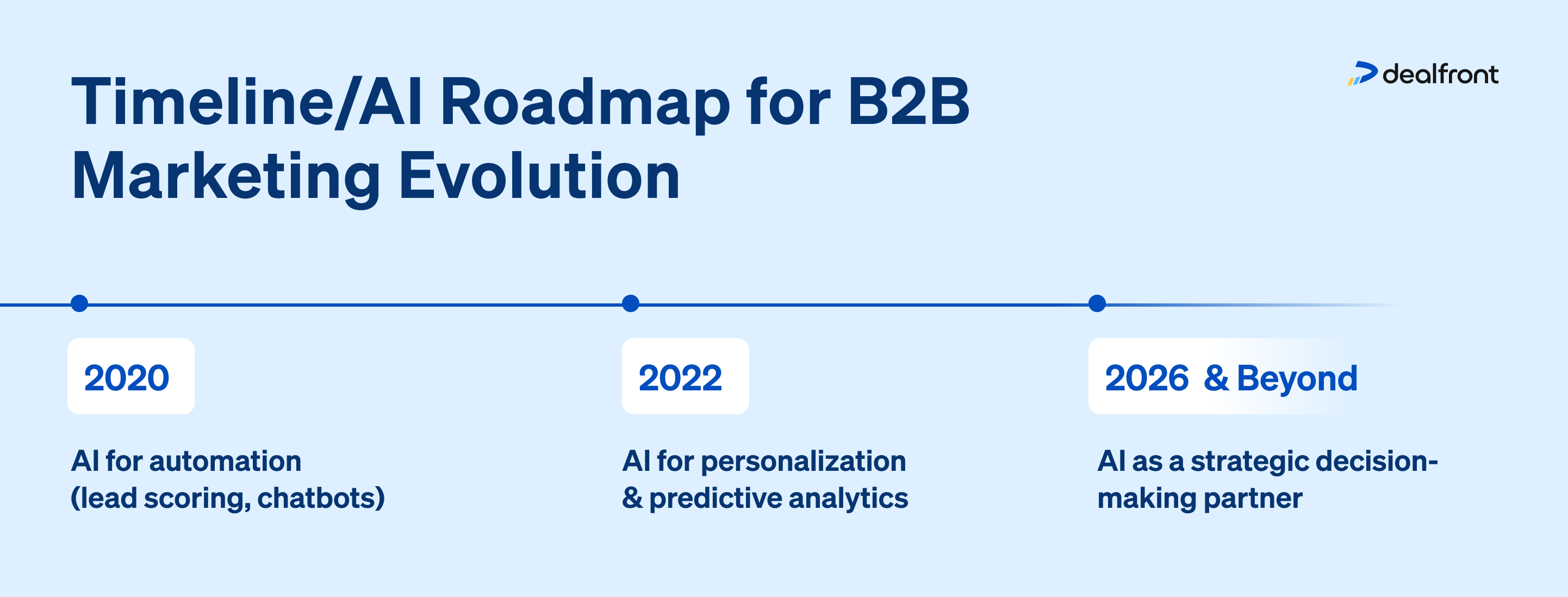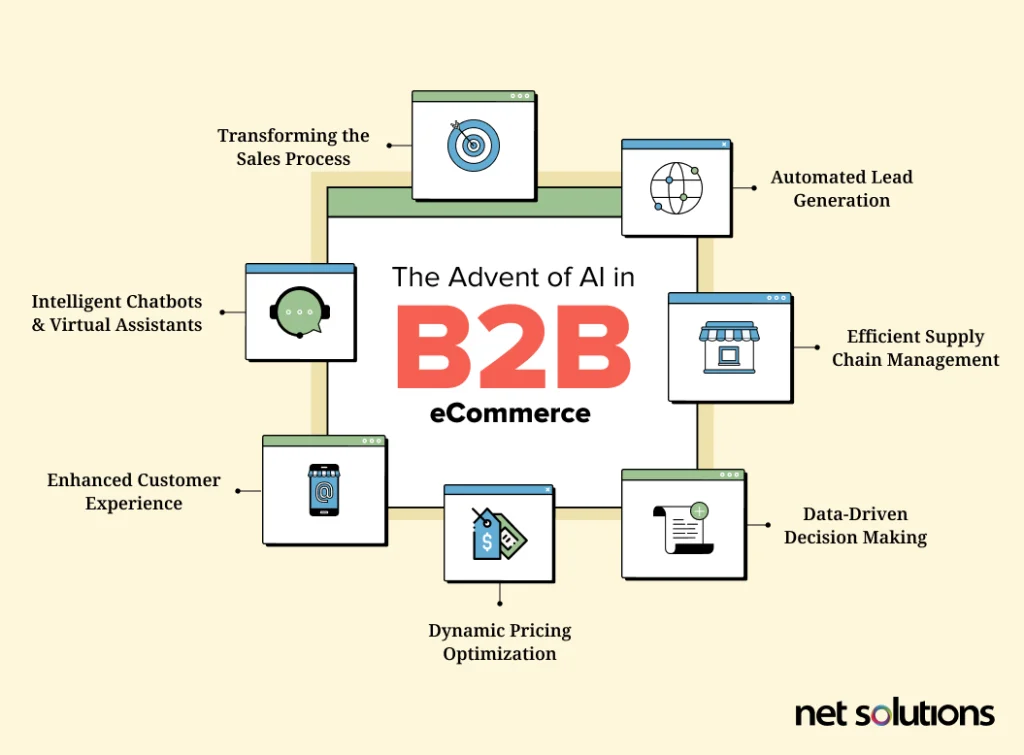The Future of B2B: Using AI Automation to Drive Success
The landscape of B2B is changing as business significantly turn to AI automation for tactical advantage. This transformation assures to boost effectiveness and customer involvement through innovative innovations. Nevertheless, the integration of these devices is not without its challenges. Recognizing how organizations can browse this progressing surface will be crucial for future success. What elements will establish the effectiveness of AI in this market? The answers may redefine conventional business models.
Comprehending AI Automation in B2B
As companies progressively look for efficiency, recognizing AI automation in B2B comes to be essential. AI automation describes making use of expert system modern technologies to streamline and improve company processes. In the B2B field, this involves the assimilation of AI tools to take care of tasks such as information analysis, customer interactions, and supply chain procedures. By leveraging artificial intelligence and all-natural language handling, companies can enhance precision, lower human mistake, and accelerate decision-making (B2B Growth Consulting). AI automation helps with the handling of huge volumes of data, making it possible for companies to remove important insights and optimize their procedures. As organizations browse this technological landscape, a detailed grip of AI automation's capacities will certainly equip them to stay competitive and responsive to market needs
Secret Benefits of AI Automation for Organizations
While many companies face raising operational needs, AI automation offers numerous benefits that can considerably enhance their efficiency. One substantial benefit is performance; AI systems can carry out repetitive jobs quicker and with higher precision than people, consequently releasing and reducing mistakes up workers for even more critical initiatives. Additionally, AI automation enables data-driven decision-making by examining vast datasets swiftly, supplying insights that inform company methods. Cost reduction is an additional vital benefit, as automation decreases labor prices and optimizes source allocation. AI can enhance scalability, enabling organizations to adapt to market changes quickly. Eventually, the integration of AI automation cultivates innovation, making it possible for firms to stay competitive in a swiftly evolving landscape.
Transforming Client Experiences With AI
AI is reshaping consumer experiences by making it possible for personalized interactions and enhancing involvement. Via the implementation of predictive analytics, businesses can anticipate client needs and preferences, causing much more tailored solutions. In addition, enhancing support procedures with AI modern technology improves efficiency and contentment, eventually changing the overall client trip.
Individualized Interactions and Interaction
Individualized interactions have actually become a cornerstone of efficient consumer involvement in the B2B landscape. By leveraging AI-driven solutions, companies can customize their interaction and offerings to fulfill the unique requirements of each customer. Automated systems assess consumer data, habits, and preferences, making it possible for companies to create customized experiences that resonate with their audience. This degree of customization not just boosts consumer satisfaction yet additionally fosters long-term commitment. In addition, AI devices promote real-time communications, enabling services to react immediately and effectively to queries and responses. Because of this, firms can develop stronger connections with clients, ensuring that their services align with evolving assumptions. Eventually, individualized interaction through AI leads to boosted results and sustained success in the affordable B2B market.
Predictive Analytics Implementation
As companies increasingly look for to enhance consumer experiences, executing anticipating analytics has actually emerged as a crucial method in the B2B sector. By leveraging data-driven understandings, organizations can expect consumer needs and choices, enabling them to tailor their offerings a lot more efficiently. Anticipating analytics utilizes sophisticated algorithms and historic information to anticipate future habits, enabling services to identify prospective challenges and chances. This aggressive approach not only boosts customer fulfillment yet additionally cultivates loyalty by providing prompt and pertinent options. In addition, anticipating analytics assists in resource allowance, ensuring that marketing efforts are concentrated on high-value leads. Inevitably, the integration of predictive analytics gears up B2B business with the devices essential to change customer interactions and drive lasting success in an increasingly competitive landscape.
Improving Support Processes
Enhancing client experiences in the B2B market prolongs past anticipating analytics; enhancing support processes plays a crucial duty. By incorporating AI-driven solutions, businesses can automate routine inquiries and improve feedback times, bring about enhanced consumer contentment. Chatbots and digital aides supply 24/7 support, dealing with client needs quickly and reducing the concern on human representatives. This automation allows teams to concentrate on intricate problems, promoting more purposeful interactions. Moreover, AI devices can examine support data to recognize patterns and areas for renovation, making sure constant enhancement of service top quality. As organizations adopt these modern technologies, they position themselves as customer-centric and receptive, ultimately driving commitment and company development in an increasingly affordable landscape.
Enhancing Operations and Processes
Enhancing operations and procedures in B2B environments is crucial for improving total effectiveness. By enhancing workflow effectiveness and automating regular tasks, companies can reduce hands-on errors and maximize valuable resources. This change not just boosts performance however additionally enables groups to concentrate on tactical campaigns that drive growth.
Enhancing Workflow Efficiency
Enhancing operations efficiency is vital for companies looking for to enhance and minimize functional costs productivity. By examining existing procedures, organizations can identify bottlenecks and redundancies that impede performance. Carrying out structured procedures boosts communication and partnership among groups, making certain that jobs are completed a lot more swiftly. Using data-driven insights allows firms to make enlightened choices that improve procedures further. In addition, adopting integrated technologies can help with seamless information flow, reducing the risk of hold-ups and mistakes. As organizations welcome these adjustments, they not just cultivate a much more active job atmosphere however likewise position themselves to react swiftly to market demands - AI Automation For B2B. Eventually, concentrating on workflow performance permits companies to designate resources effectively, driving lasting success in a significantly competitive landscape
Automating Routine Jobs
Several companies are progressively turning to automation to take care of regular tasks, recognizing its prospective to significantly enhance functional effectiveness. By deploying AI-driven remedies, firms can improve repetitive tasks such as data entry, invoice handling, and client inquiries. This change not only lowers human mistake but additionally liberates valuable staff member time, permitting personnel to concentrate on critical efforts and value-added jobs. Additionally, automation can enhance response times and solution consistency, leading to boosted customer satisfaction. As organizations navigate an affordable landscape, leveraging automation for routine tasks comes to be necessary for preserving and enhancing process agility. Ultimately, this strategy fosters technology and drives development, placing organizations for lasting success in the developing B2B environment.
Enhancing Decision-Making Through Information Insights

Getting Rid Of Obstacles in AI Implementation
Although AI application holds the pledge of substantial functional improvements, organizations commonly encounter a myriad of challenges that can hinder progress. Key obstacles include data quality issues, as many enterprises struggle with incomplete or irregular datasets essential for reliable AI training. In addition, resistance to transform within the labor force can hamper the adoption of AI innovations, as employees may be afraid work variation or lack the required skills. Budget restraints additionally provide a difficulty, limiting investment in the called for facilities and skill. Incorporating AI systems with existing processes can be complex, requiring significant time and sources. Getting rid of these difficulties necessitates a strategic strategy that includes detailed training, adjustment monitoring, and a commitment to constant renovation in AI campaigns.
Future Trends: The Next Frontier in B2B Automation
While the landscape of B2B automation proceeds to advance, arising fads are poised to redefine just how companies operate. The combination of advanced expert system will certainly assist in more tailored client experiences, allowing companies to customize services specifically to client demands. The rise of predictive analytics will allow companies to anticipate market shifts and maximize decision-making processes. Automation of routine jobs through robot process automation (RPA) will boost performance, lowering operational expenses substantially. Additionally, the fostering of blockchain modern technology promises improved transparency and security in deals. As these technologies gain grip, companies will progressively utilize AI-driven understandings to foster collaboration, improve supply chains, and boost total performance, noting a transformative change in the B2B landscape.
Frequently Asked Questions
What Kinds Of Services Can Profit The Majority Of From AI Automation?
Manufacturing, logistics, and customer service companies can benefit most from AI automation. These markets improve functional efficiency, decrease expenses, and enhance client interactions, eventually causing boosted efficiency and earnings in an affordable market.
Exactly How Can Local Business Carry Out AI Automation Successfully?
Tiny services can carry out AI automation successfully by determining repeated tasks, choosing user-friendly devices, making certain ample training for staff members, and slowly integrating solutions to maximize operations while checking efficiency and changing see it here methods based upon comments.
What Prevail Mistaken Beliefs Regarding AI in B2B?
Common mistaken beliefs regarding AI in B2B include the idea that it is just for big enterprises, that it assures instantaneous results, which it can completely replace human decision-making instead than enhancing it. AI Automation For B2B.
Just How Does AI Automation Effect Employee Responsibilities and Job Security?
AI automation improves employee duties by enhancing repetitive jobs, fostering performance and development. While some fear task loss, it frequently develops opportunities for upskilling and brand-new positions, inevitably enhancing work safety and security via added worth and productivity.
What Skills Are Required to Manage AI Automation Projects?

As organizations increasingly seek performance, understanding AI automation in B2B ends up being crucial. AI automation helps with the handling of big quantities of information, enabling services to remove valuable insights and enhance their procedures. While many companies grapple with boosting functional needs, AI automation presents various advantages that can markedly boost their performance. Automation of regular jobs via robot procedure automation (RPA) will enhance efficiency, decreasing operational expenses substantially. Production, logistics, and consumer solution businesses can benefit most from AI automation.